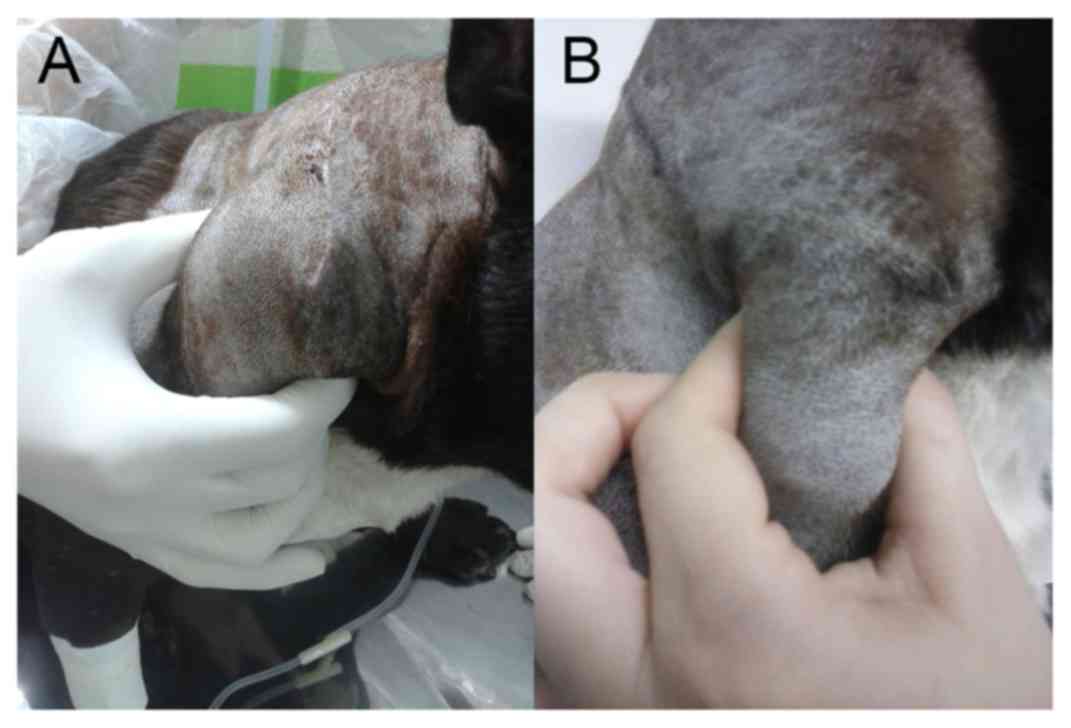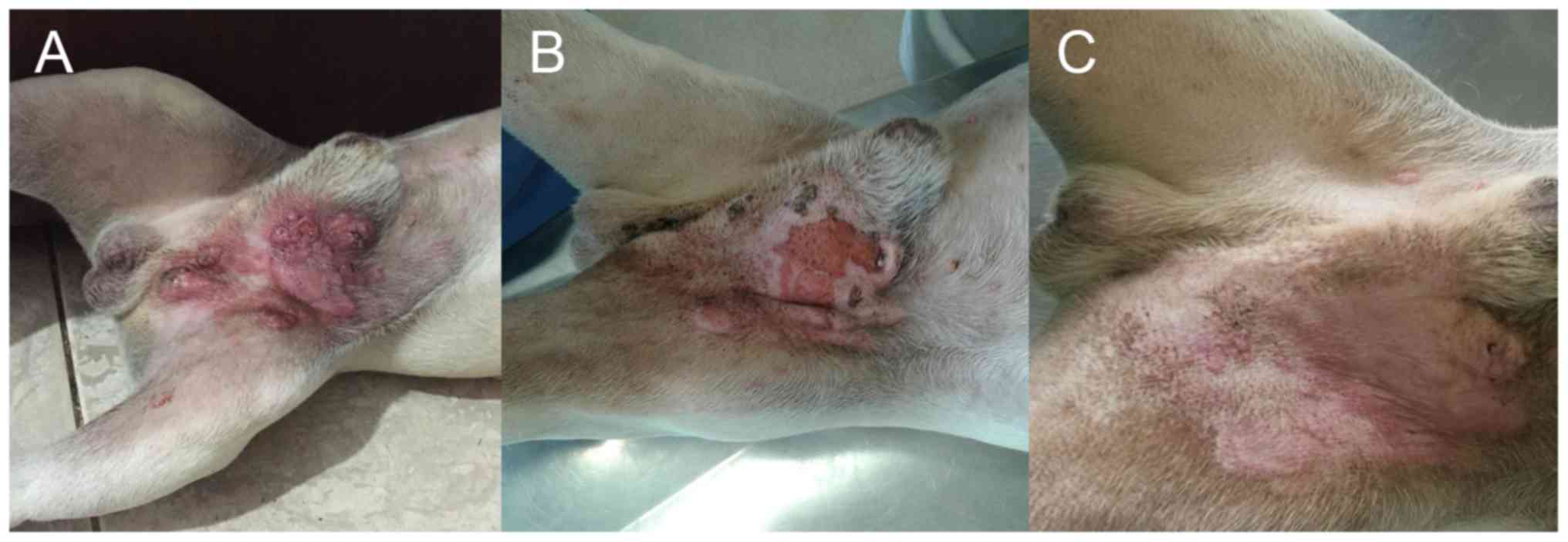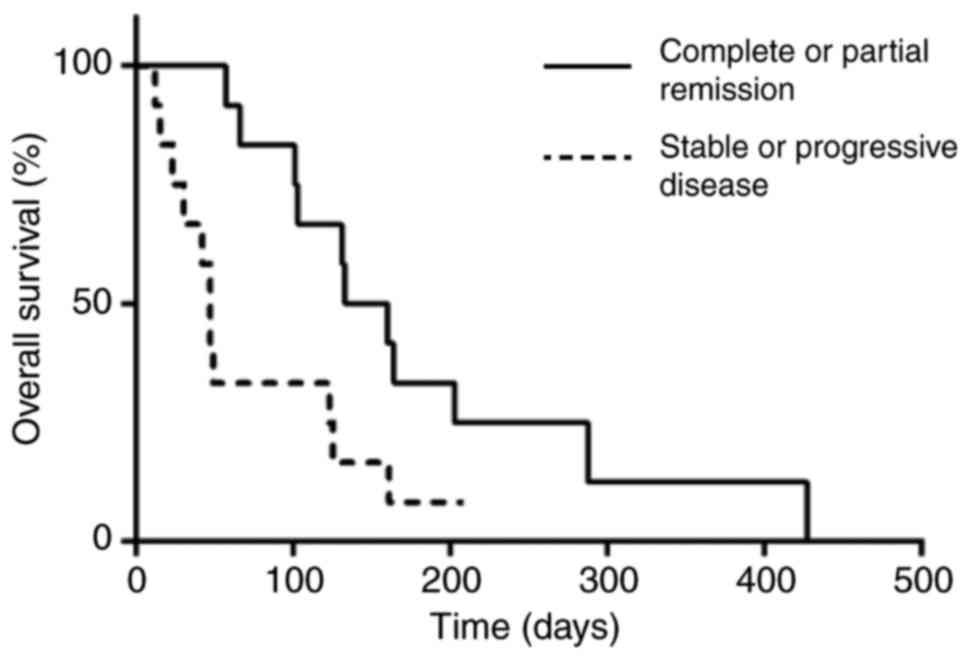|
1
|
Dobson JM and Scase TJ: Advances in the
diagnosis and management of cutaneous mast cell tumours in dogs. J
Small Anim Pract. 48:424–431. 2007. View Article : Google Scholar : PubMed/NCBI
|
|
2
|
Welle MM, Bley CR, Howard J and Rüfenacht
S: Canine mast cell tumours: A review of the pathogenesis, clinical
features, pathology and treatment. Vet Dermatol. 19:321–339. 2008.
View Article : Google Scholar : PubMed/NCBI
|
|
3
|
London CA and Thamm DH: Mast cell
tumorsSmall Animal Clinical Oncology. Withrow SJ, Vail DM and Page
RL: 5th. WB Saunders Co; Philadelphia, PA: pp. 335–355. 2013,
View Article : Google Scholar
|
|
4
|
Warland J, Brioschi V, Owen L and Dobson
J: Canine mast cell tumours: Decision-making and treatment. In
Pract. 37:315–332. 2015. View Article : Google Scholar
|
|
5
|
Simpson AM, Ludwig LL, Newman SJ, Bergman
PJ, Hottinger HA and Patnaik AK: Evaluation of surgical margins
required for complete excision of cutaneous mast cell tumors in
dogs. J Am Vet Med Assoc. 224:236–240. 2004. View Article : Google Scholar : PubMed/NCBI
|
|
6
|
Amora A and Scholar EM: Role of tyrosine
kinase inhibitors in cancer therapy. J Pharmacol Exp Ther.
315:971–979. 2005. View Article : Google Scholar : PubMed/NCBI
|
|
7
|
London CA: Tyrosine kinase inhibitors in
veterinary medicine. Top Companion Anim Med. 24:106–112. 2009.
View Article : Google Scholar : PubMed/NCBI
|
|
8
|
Weinstein IB and Joe A: Oncogene
addiction. Cancer Res. 68:3077–3080. 2008. View Article : Google Scholar : PubMed/NCBI
|
|
9
|
Silva RLA: Oncogenes e genes supressores
de tumorOncologia molecular. Ferreira CG and Rocha JCC: 2nd.
Atheneu, São Paulo, SP: pp. 43–59. 2010
|
|
10
|
Webster JD: Small molecule kinase
inhibitors in veterinary oncology. Vet J. 205:122–3. 2015.
View Article : Google Scholar : PubMed/NCBI
|
|
11
|
Zemke D, Yamini B and Yuzbasiyan-Gurkan V:
Mutations in the juxtamembrane domain of c-KIT are associated with
higher grade mast cell tumors in dogs. Vet Pathol. 39:529–535.
2002. View Article : Google Scholar : PubMed/NCBI
|
|
12
|
Webster JD, Yuzbasiyan-Gurkan V, Kaneene
JB, Miller R, Resau JH and Kiupel M: The role of c-KIT in
tumorigenesis: Evaluation in canine cutaneous mast cell tumors.
Neoplasia. 8:104–111. 2006. View Article : Google Scholar : PubMed/NCBI
|
|
13
|
Avery AC: Molecular diagnostics of
hematologic malignancies in small animals. Vet Clin North Am Small
Anim Pract. 42:97–110. 2012. View Article : Google Scholar : PubMed/NCBI
|
|
14
|
Takeuchi Y, Fujino Y, Watanabe M,
Takahashi M, Nagawa T, Takeuchi A, Bonkobara M, Kobayashi T, Ohno
K, Uchida K, et al: Validation of the prognostic value of
histopathological grading or c-kit mutation in canine cutaneous
mast cell tumours: A retrospective cohort study. Vet J.
196:492–498. 2013. View Article : Google Scholar : PubMed/NCBI
|
|
15
|
Perou CM, Sørlie T, Eisen MB, van de Rijn
M, Jeffrey SS, Rees CA, Pollack JR, Ross DT, Johnsen H, Akslen LA,
et al: Molecular portraits of human breast tumours. Nature.
406:747–752. 2000. View
Article : Google Scholar : PubMed/NCBI
|
|
16
|
Sleijfer S, Wiemar E and Verweij J: Drug
Insight: Gastrointestinal stromal tumors (GIST)-the solid tumor
model for cancer-specific treatment. Nat Clin Pract Oncol.
5:102–111. 2008. View Article : Google Scholar : PubMed/NCBI
|
|
17
|
Isotani M, Ishida N, Tominaga M, Tamura K,
Yagihara H, Ochi S, Kato R, Kobayashi T, Fujita M, Fujino Y, et al:
Effect of tyrosine kinase inhibition by imatinibmesylate on mast
cell tumors in dogs. J Vet Intern Med. 22:985–988. 2008. View Article : Google Scholar : PubMed/NCBI
|
|
18
|
London CA, Malpas PB, Wood-Follis SL,
Boucher JF, Rusk AW, Rosenberg MP, Henry CJ, Mitchener KL, Klein
MK, Hintermeister JG, et al: Multi-center, placebo-controlled,
double-blind, randomized study of oral toceranib phosphate
(SU11654), a receptor tyrosine kinase inhibitor, for the treatment
of dogs with recurrent (either local or distant) mast cell tumor
following surgical excision. Clin Cancer Res. 15:3856–3865. 2009.
View Article : Google Scholar : PubMed/NCBI
|
|
19
|
Ogilvie GK, Hensel P, Kitchell BE,
Dubreuil P and Ahn A: Masitinib-a targeted therapy with
applications in veterinary oncology and inflammatory diseases. CAB
Rev. 6:1–11. 2011. View Article : Google Scholar
|
|
20
|
Krick EL, Billings AP, Shofer FS, Watanabe
S and Sorenmo KU: Cytological lymph node evaluation in dogs with
mast cell tumours: Association with grade and survival. Vet Comp
Oncol. 7:130–138. 2009. View Article : Google Scholar : PubMed/NCBI
|
|
21
|
Patnaik AK, Ehler WJ and MacEwen EG:
Canine cutaneous mast cell tumor: Morphologic grading and survival
time in 83 dogs. Vet Pathol. 21:268–274. 1984. View Article : Google Scholar
|
|
22
|
Kiupel M, Webster JD, Bailey KL, Best S,
DeLay J, Detrisac CJ, Fitzgerald SD, Gamble D, Ginn PE, Goldschmidt
MH, et al: Proposal of a 2-tier histologic grading system for
canine cutaneous mast cell tumors to more accurately predict
biological behavior. Vet Pathol. 48:147–155. 2011. View Article : Google Scholar : PubMed/NCBI
|
|
23
|
Kiupel M, Webster JD, Kaneene JB, Miller R
and Yuzbasiyan-Gurkan V: The use of KIT and tryptase expression
patterns as prognostic tools for canine cutaneous mast cell tumors.
Vet Pathol. 41:371–377. 2004. View Article : Google Scholar : PubMed/NCBI
|
|
24
|
Scase TJ, Edwards D, Miller J, Henley W,
Smith K, Blunden A and Murphy S: Canine mast cell tumors:
Correlation of apoptosis and proliferation markers with prognosis.
J Vet Intern Med. 20:151–158. 2006. View Article : Google Scholar : PubMed/NCBI
|
|
25
|
Nguyen SM, Thamm DH, Vail DM and London
CA: Response evaluation criteria for solid tumours in dogs (v1.0):
A veterinary cooperative oncology group (VCOG) consensus document.
Vet Comp Oncol. 13:176–183. 2015. View Article : Google Scholar : PubMed/NCBI
|
|
26
|
Veterinary Co-operative Oncology Group
(VCOG), . Veterinary co-operative oncology group-common terminology
criteria for adverse events (VCOG-CTCAE) following chemotherapy or
biological antineoplastic therapy in dogs and cats v1.0. Vet Comp
Oncol. 2:195–213. 2004. View Article : Google Scholar : PubMed/NCBI
|
|
27
|
Smrkovski OA, Essick L, Rohrbach BW and
Legendre AM: Masitinibmesylate for metastatic and non-resectable
canine cutaneous mast cell tumours. Vet Comp Oncol. 13:314–321.
2015. View Article : Google Scholar : PubMed/NCBI
|
|
28
|
Hahn KA, Ogilvie G, Rusk T, Devauchelle P,
Leblanc A, Legendre A, Powers B, Leventhal PS, Kinet JP, Palmerini
F, et al: Masitinib is safe and effective for the treatment of
canine mast cell tumors. J Vet Intern Med. 22:1301–1309. 2008.
View Article : Google Scholar : PubMed/NCBI
|
|
29
|
Antonescu CR, Besmer P, Guo T, Arkun K,
Hom G, Koryotowski B, Leversha MA, Jeffrey PD, Desantis D, Singer
S, et al: Acquired resistance to imatinib in gastrointestinal
stromal tumor occurs through secondary gene mutation. Clin Cancer
Res. 11:4182–4190. 2005. View Article : Google Scholar : PubMed/NCBI
|
|
30
|
Dohse M, Scharenberg C, Shukla S, Robey
RW, Volkmann T, Deeken JF, Brendel C, Ambudkar SV, Neubauer A and
Bates SE: Comparison of ATP-binding cassette transporter
interactions with the tyrosine kinase inhibitors imatinib,
nilotinib, and dasatinib. Drug Metab Dispos. 38:1371–1380. 2010.
View Article : Google Scholar : PubMed/NCBI
|
|
31
|
Mealey KL and Fidel J: P-glycoprotein
mediated drug interactions in animals and humans with cancer. J Vet
Intern Med. 29:1–6. 2015. View Article : Google Scholar : PubMed/NCBI
|
|
32
|
Shukla S, Robey RW, Bates SE and Ambudkar
SV: Sunitinib (Sutent, SU11248), a small-molecule receptor tyrosine
kinase inhibitor, blocks function of the ATP-binding cassette (ABC)
transporters P-glycoprotein (ABCB1) and ABCG2. Drug Metab Dispos.
37:359–365. 2009. View Article : Google Scholar : PubMed/NCBI
|
|
33
|
Hoffmann K, Franz C, Xiao Z, Mohr E, Serba
S, Büchler MW and Schemmer P: Sorafenib modulates the gene
expression of multi-drug resistance mediating ATP-binding cassette
proteins in experimental hepatocellular carcinoma. Anticancer Res.
30:4503–4508. 2010.PubMed/NCBI
|
|
34
|
Grant J, North S and Lanore D: Clinical
response of masitinib mesylate in the treatment of canine
macroscopic mast cell tumours. J Small Anim Pract. 57:283–290.
2016. View Article : Google Scholar : PubMed/NCBI
|
|
35
|
Giantin M, Granato A, Baratto C, Marconato
L, Vascellari M, Morello EM, Vercelli A, Mutinelli F and Dacasto M:
Global gene expression analysis of canine cutaneous mast cell
tumor: Could molecular profiling be useful for subtype
classification and prognostication? PLoS One. 9:e954812014.
View Article : Google Scholar : PubMed/NCBI
|
|
36
|
Casagrande TA Costa, de Oliveira Barros
LM, Fukumasu H, Cogliati B, Chaible LM, Dagli ML and Matera JM: The
value of molecular expression of KIT and KIT ligand analysed using
real-time polymerase chain reaction and immunohistochemistry as a
prognostic indicator for canine cuteaneous mast cell tumours. Vet
Comp Oncol. 13:1–10. 2015. View Article : Google Scholar : PubMed/NCBI
|
|
37
|
Berlato D, Murphy S, Monti P, Stewart J,
Newton JR, Flindall A and Maglennon GA: Comparison of mitotic index
and Ki67 index in the prognostication of canine cutaneous mast cell
tumours. Vet Comp Oncol. 13:143–150. 2015. View Article : Google Scholar : PubMed/NCBI
|
|
38
|
Miller RL, Van Lelyveld S, Warland J,
Dobson JM and Foale RD: A retrospective review of treatment and
response of high-risk mast cell tumours in dogs. Vet Comp Oncol.
14:361–370. 2016. View Article : Google Scholar : PubMed/NCBI
|

















